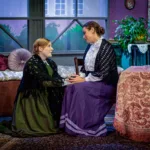Season 75 Play 3 – Rutherford & Son by Githa Sowerby

Directed by
Cast
Ann – Julie Boldy
Mary – Justine Geraghty
John – Elliott Matthews
Richard – Josh Freeman
John Rutherford – Alan Stockdill
Martin – David Elliott
Mrs Henderson – Deborah Mouat
Synopsis
Githa Sowerby’s astonishing play was inspired by her own experience of growing up in a family-run factory in Gateshead. Writing in 1912, when female voices were seldom heard on British stages, she claims her place alongside Ibsen and Shaw with this searing depiction of class, gender, and generational warfare.
In a Northern industrial town, John Rutherford rules both factory and family with an iron will. Even as the furnaces burn relentlessly at the Glassworks, at home his children begin to turn against him. This is a thrilling Edwardian melodrama and a beautifully well observed character study of a dynasty under threat from progress, familial reticence, and rebellion.
This blunt, dour businessman has devoted his entire life to running the family business and he cares for nothing else. But times are tough. The firm is in debt and on its last legs, he’s now answerable to a board and the unions, and, worse, he fears what will happen to Rutherford and Son when he’s six feet under….
Directors Notes
In 2000 the National Theatre named Rutherford and Son as one of the top 100 plays of the twentieth century.
Our Production, Rutherford and Son was written and first performed to great acclaim in 1912; it received rapturous reviews. The play was considered ahead of its time by many critics and comparisons to Ibsen and Shaw were drawn. Those thoughts were soon overlooked once the male journalists of the day were informed that the play was written by Githa Sowerby an established children’s author. The press of the day was absolutely astounded that a “beautiful young woman” could write such a searing drama, attacking the hypocrisy of the middle class Victorian patriarchal system: “most unbecoming of a woman”. To write the play Githa drew on her experience of growing up in the northeast industrial heartland; she was the daughter and granddaughter of owners of a glassmaking dynasty. Rutherford and Son is based on the life of her grandfather and is a denunciation of those who allow the worship of profit to destroy the lives of both their families and the people who work for them. The play is a powerful exploration of gender, class, and family politics. The background of the play takes place amidst a period of great change encompassing the Public Health Act of 1848: improving urban health conditions to lower death rates, and, in 1857, The Matrimonial Causes Act rendering divorce a civil rather than a religious act and therefore more accessible for middle class women to be able to divorce. There followed, in 1882, The Married Women’s Property Act allowing women to control the property they brought to a marriage. It is against these turbulent events of the second half of the 19th century that the story of the Rutherford family begins to unfold.
The BLT Rutherford and Son production team take great pleasure in bringing this great drama to life, transporting you back in time to 1885 and to the Rutherford household.
Notes For the Audience:
Moloch – In the play John Rutherford speaks of the ritual child sacrifice to the pagan god Moloch (referred to in the Bible as Baal). The furnaces in which pressed glass was sealed for firing look very similar to those in the body of this Canaanite fire God. Indeed, the lives of several generations of the family, and the families of their workforce, were dedicated before they were born, to minister to the needs of the fiery furnaces of the glassworks.
Glass making in the 19th century. – At the time of Rutherford and Son glass making ingredients were kept in heated ceramic pots in a molten state, within a furnace, until the glass blowers and craftsmen were ready to use it. Glassmakers would manipulate the molten glass using various methods; shaping by blowing, pouring, stamping etc. These processes had been mechanised by the late 19th century which resulted in the widespread availability of glass for a variety of social classes.
Lehr, – an open oven at both ends used for heating ceramic pot arches for use in the glass making process.
Lehr man. – Supervisor in charge of a lear oven.
Metal – Another word for glass, or specific glass recipe.
Muffle Furnace – A small tabletop furnace used for small batch glass making.
Pot Setting – The process of setting the pots in the furnace.
White metal – The specific kind of clear glass for which John Jr has discovered the recipe.
Acknowledgements – I am grateful you to the invaluable assistance of Patricia Riley who was a great help during my research for the play, as was her book “Looking for Githa” available from Stairwell Books www.stairwellbooks.co.uk A big thank you to my wife, Julie for assisting and supporting me before and during rehearsals. Thanks also to our talented cast, production, stage and back-office team: an army of unsung volunteers without whom none of this would be possible





















